|
November 2, 2020 - No. 7
Important Matters on Eve of U.S. Elections
People Stand at the Ready for
Election Results
- Voice of Revolution - 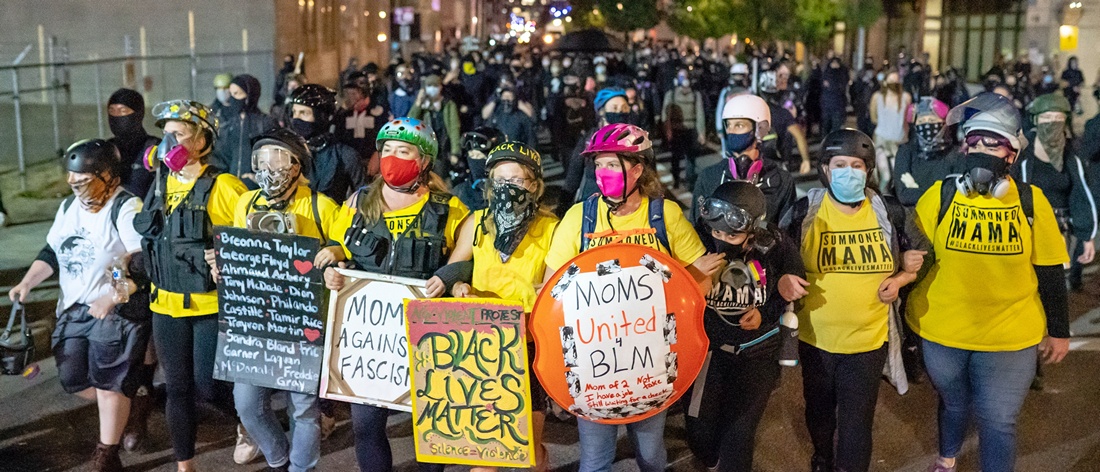
August 26, 2020. Portland Wall of Moms protects protesters from state violence. (N. Howard)
• Threat to Use Military and Federal Forces Post Election
Methods Considered to Avoid Post-Election Violence
• Resorting to Congress and 25th Amendment of the Constitution in Hopes of a "Peaceful Transition"
• Role of Congress and Electoral College
For Your Information
• Amendment XXV of U.S. Constitution
• Navy SEAL Says He Voted for Joe Biden
Discussion
• Illusions that U.S. Constitution Can Resolve Today's
Problems
- Kathleen Chandler
Important Matters on Eve of U.S. Elections
- Voice of Revolution - 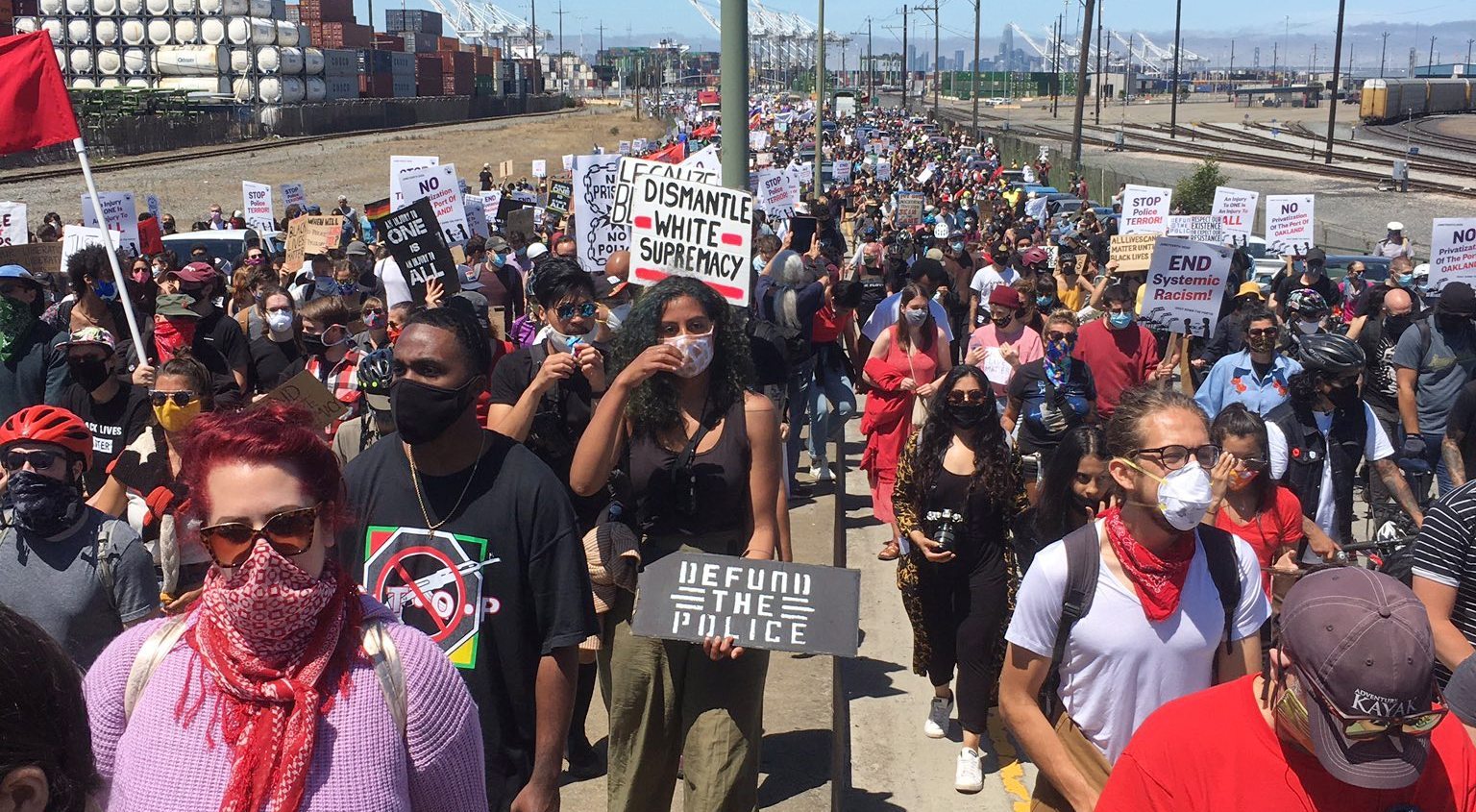
June 19, 2020. International Longshore and Warehouse Union holds
Juneteenth walkout and march in Oakland and other ports.
November 3 is Election Day and people are standing at the ready for the
results. One main result expected is that neither presidential
candidate will be declared the winner on election night due to the
large number of mail-in ballots as a result of the pandemic. As of the
morning of November 2, more than 95 million people have already voted
including tens of millions by
mail-in ballot. Some states are unable to start counting them until
election day.
At least six of these states could go either way -- Arizona,
Florida, Michigan, North Carolina, Pennsylvania and Wisconsin. In
Arizona, Florida and North Carolina votes can be counted before
election day. In Michigan, Pennsylvania and Wisconsin they cannot. As
well, for many states, mail-in ballots can be accepted for several days after
the
election. The six states that could go either way account for
a total of 101 electoral college votes, with 270 necessary to secure
election. If the results are close then it will not be possible to
announce a winner, whether Trump or Biden.
Trump said on October 26 that the presidential contest "must have
final total on November 3." He has also continued reiterating his claim
that given the number of mail-in ballots, the election will be a fraud
that he will not accept unless he is the winner. He has threatened use
of federal forces and the military if there is resistance to him
disputing the results and claiming he will not leave office. On
November 1 he said his lawyers will challenge vote counts as soon as
polls close November 3, indicating he may try a legal route first.
The
general anger with the whole election process this year is such that
people are anticipating a disputed election and they are standing ready
to go into action. The 70,000 member Rochester Labor Council passed a
resolution October 8 calling for a general strike if Trump does not
respect the outcome of the election. Rochester Labor Council President
Dan Maloney helped lead a six-week strike at GM in 2019. He said the
council hoped the resolution would spark a national conversation. The
resolution said in part that the council "stands firmly in opposition
to any effort to subvert, distort, misrepresent or disregard the final
outcome of the 2020 Presidential elections." It also spoke to the
"diminished" quality of existing institutions and demanded that the
courts not be used to determine the results. AFL-CIO
head Richard Trumka has said, "Democracies are not guaranteed by judges
or lawyers. The survival of our democratic republic depends on us."
Speaking about Pennsylvania, he said: "Millions of commonwealth voters,
not nine court justices, will decide the 2020 election." This
is an indication that if disputed vote counts go as far as the Supreme
Court, workers and their unions will not accept it. The call for a general strike comes at a time when strike levels are
high, with 1,160 strikes since March. The high number of strikes is partly due to the
strength of the broad movement for equality and rights, anger with
unsafe COVID-19 conditions and the strong stand among workers that they
are upholding their social responsibilities and government has a duty
to do the same. While there are without doubt various views about the elections and
the existing democracy, what is clear is that workers are organizing as
a social force to play a role in the political life of the country.
Their role is not just one of voting, producing and consuming but of
having a leading role in deciding the direction of the country. That is
the
significance of the call for a general strike.
 In
addition, a coalition of many coalitions has been formed, called Protect
the Results. It has already announced more than 470 actions planned,
potentially as early as November 4. The Coalition states: "In the event
that Donald Trump loses the election and refuses to concede or
undermines the results, the Protect the Results partner network will
activate their members and take coordinated action to protect our
democracy." The organizations involved include unions like the Service
Employees International Union and the Communications Workers of America
that include many frontline workers, Black Lives Matter,
as well as organizations of environmentalists, youth, immigrant rights and anti-war activists and many others.
More than 160 coalitions and organizations are involved in major cities
across the country, south and north. In
addition, a coalition of many coalitions has been formed, called Protect
the Results. It has already announced more than 470 actions planned,
potentially as early as November 4. The Coalition states: "In the event
that Donald Trump loses the election and refuses to concede or
undermines the results, the Protect the Results partner network will
activate their members and take coordinated action to protect our
democracy." The organizations involved include unions like the Service
Employees International Union and the Communications Workers of America
that include many frontline workers, Black Lives Matter,
as well as organizations of environmentalists, youth, immigrant rights and anti-war activists and many others.
More than 160 coalitions and organizations are involved in major cities
across the country, south and north.
Various other organizations are also preparing to be at the polls to
defend the right to vote and also afterwards if there is a dispute. It
is evident from the stand of many involved that the issue is not
simply Trump, but rather that people must have a greater role to play
in deciding the future. Many are already active in the struggle for
justice and equality as well as for health care and housing given the
COVID-19 pandemic. There is increasing debate as to what the phrase
"our
democracy" actually means. Many are rejecting the existing set-up that
excludes candidates from third parties, produces candidates people do
not like, makes it difficult for workers to run and be elected,
continues to suppress voters in many ways and, overall, keeps the
people out of power.
Debates are also taking place about gaining control over policing
and budgets and the necessity for a democracy created by the people and
serving their interests. Actions demanding accountability after
November 3 are geared to further raise this necessity in people's minds
and fight for it. 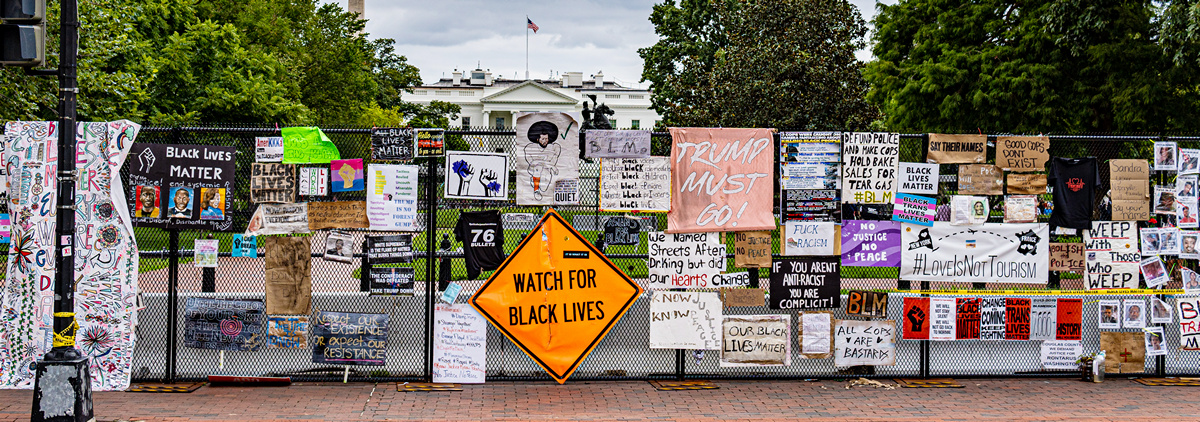
Voice of Revolution is a publication of the U.S. Marxist-Leninist
Organization. 
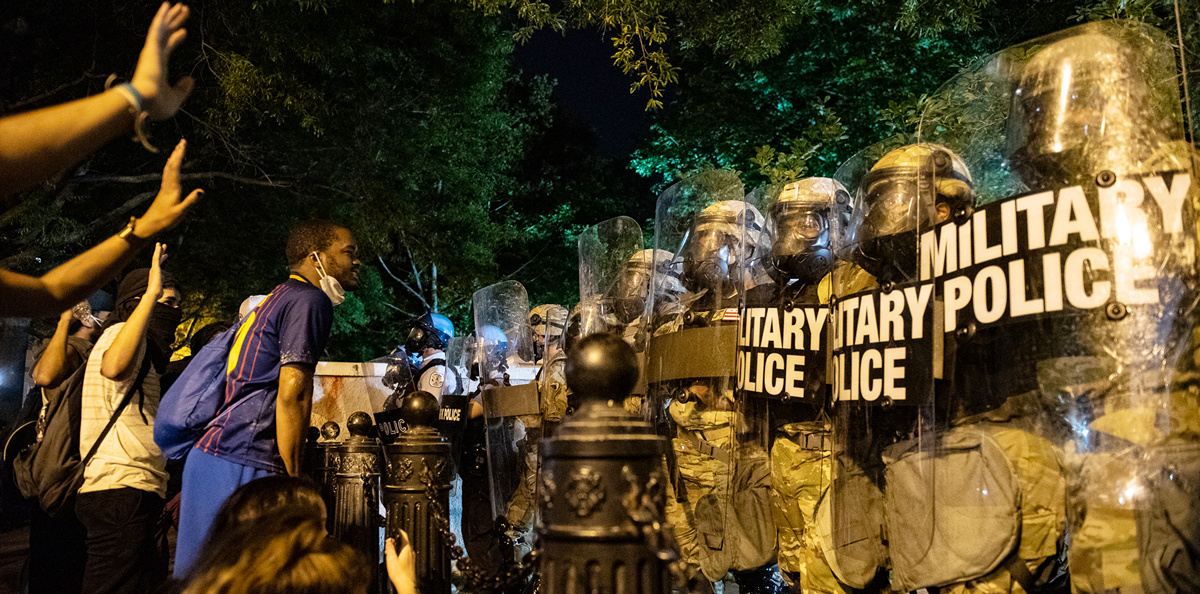
May
30, 2020. Military police deployed against people in Washington, DC
protesting police violence and impunity in the wake of the killing of
George Floyd.
Great concerns are being raised both among the
rich and among the people, that there will not be a "peaceful
transition" in this election. Open violence could erupt among the
factions of the rich as they vie for the presidency. Racist, Hitlerite
armed militias could be used by the state to foment violence against
the people. President
Trump has threatened use of the military against any, including elected
officials and protesters, who refuse to accept him as president if he
decides to declare victory. Biden, for his part, has said the military
will escort Trump out of the White House if he loses and refuses to
leave. The
president is not sworn in until January 20, 2021, so the entire period
from
November 3 to January 20 is expected to see manoeuvres and violence of
various kinds by governments at all levels.
The concern among the rulers is such that their Quincy Institute for
Responsible Statescraft (QI), founded by billionaires Charles Koch and
George Soros and said to bring together the "right" and the "left,"
held a webinar titled, "The U.S. Military's Role in a Contested
Election." They asked, "What role, if any, might the United States
military
play if the results of the upcoming presidential election are
contested?" "How does the military remain apolitical and not succumb to
electoral politics? How might an election-related crisis affect the
relationship between the American people and the U.S. military, which
polls continue to say is the most trusted institution in America? And
what are
the military's constitutional responsibilities, should the president
refuse to leave office in a contested election?"[1]
It is evident from these questions that one possibility raised is
for the military, the "most trusted institution," to itself take
command in the name of preserving the Union and the Constitution. If
the actions of the president, such as refusing to leave, are considered
unlawful, then the military would be seen as upholding the law.
The oath of office for all officers is to the Constitution, against
enemies both foreign and domestic, and not to the president. At the
same time, the oath for enlisted soldiers, who could be called into
action, includes obeying the lawful orders of the president and their
officers.[2]
There is also concern that the military, which has been used against
rebellions by African Americans in the past, will lose whatever
credibility it has if it intervenes. In Washington, DC on June 1, the
military police were already used by Trump against protesters in
Lafayette Square with 1,600 troops on standby. With demonstrations
ongoing
in many cities and hundreds more planned if Trump contests the election
results, along with possible strikes, Trump may well call for use of
the military. When he previously threatened such action, various
generals and active-duty soldiers objected. Some among the National
Guard deployed to the cities refused to attack protesters.
In such conditions the rulers are not able to predict how the
military and various generals and admirals might divide or coalesce or
act in a contested election. An Admiral who long commanded the Navy
SEALs, for example, recently said in a Wall Street Journal
op-ed that he voted for Biden. "[I]f we fail to choose the right
leader,
then we will pay the highest price for our neglect and
shortsightedness," he said. Navy SEALs are well-known for their black
ops outside the law. The role other policing agencies might play is
another factor creating uncertainty. Both Immigration and Customs
Enforcement (ICE) and Customs and Border Protection (CBP) have
expressed their
support for Trump and this is a factor. There is also the Secret
Service to contend with.
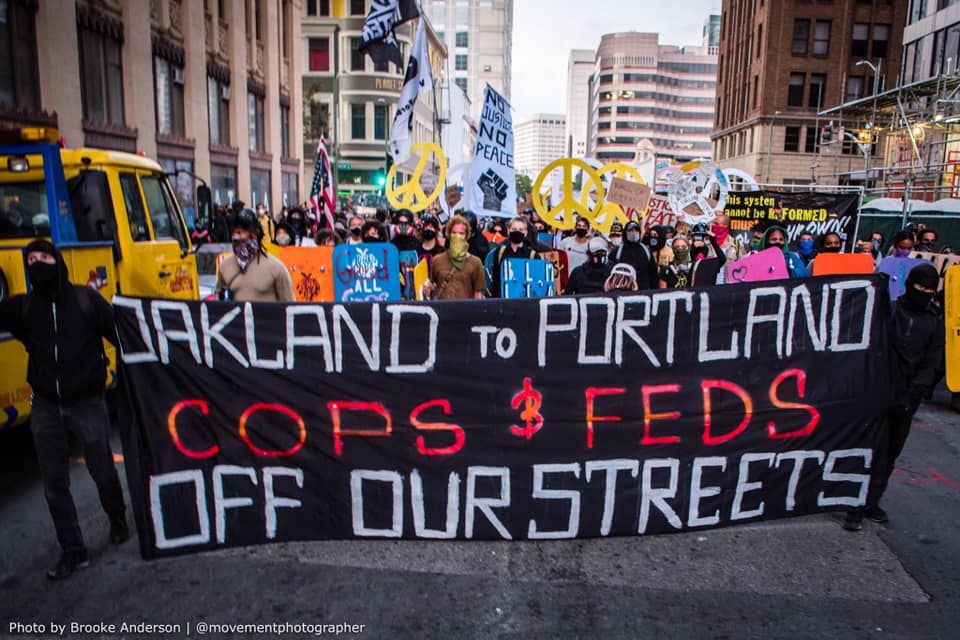 There
is no unified military in the U.S. and the competition within and
between the Army, Navy, Marines, Air Force and the new Space Force is
very great, as well as with the CIA and other intelligence agencies.
Keeping them unified and under the control of the president as
Commander-in-Chief is not only critical but a particular
responsibility which falls on the President whose duty it is to
preserve the Union. There
is no unified military in the U.S. and the competition within and
between the Army, Navy, Marines, Air Force and the new Space Force is
very great, as well as with the CIA and other intelligence agencies.
Keeping them unified and under the control of the president as
Commander-in-Chief is not only critical but a particular
responsibility which falls on the President whose duty it is to
preserve the Union.
A main point of discussion is that if the election is contested
right through to Inauguration Day on January 20, what might happen? If
Biden wins but Trump refuses to leave, who then is the
Commander-in-Chief and how would the vying forces be brought together?
Whether or not these scenarios play out, the very posing of the
questions reveals that the existing arrangements no longer function and the
rulers are scrambling to occupy the space for change in a manner that
perpetuates their rule. It shows the futility of appealing to
institutions and a Constitution which cannot cope with the needs of the
present.
Most importantly, it shows the futility of keeping the people out of
power.
Conditions of civil war have been sharpening throughout this period.
These include the conflicts within and between the military and
the president; those between state and federal governments concerning
COVID-19, immigration, funding and policing; and those between local,
state and federal policing and intelligence agencies, all armed to the
teeth.
An election is supposed to resolve conflicts between factions by
providing a method to declare a winner. It is supposed to block the use
of violence between rivals who are supposed to abide by the rules, such
as conceding to the winner. However, the levels of fraud, corruption,
manipulation and disruption have become so extreme as contending
private interests strive to usurp the state power that rules no longer
apply to guide all the different interests on how to act. Far from
elections serving as a method to resolve the conflicts peacefully,
anarchy and violence prevail.
Conditions are anything but peaceful given both the ongoing
repression of protests and the interference in the election by members
of the cabinet, generals and diplomats coupled with threats to use the
military against the people and for control of the presidency.
Vigilance is required as people continue to stand up for their
rights and reject the use of the military and police against them. From
coast to coast, working people and youth are leading people from all
walks of life to face any contingency. Bringing forward a democracy of
the people that can resolve social and political problems without the
use of
force is the order of the day.
Notes 1. Speakers included:
Andrew Bacevich, President of the Quincy Institute and retired Army
colonel; Mark Hertling, a 37-year retired Army General who was
Commander in Europe, Baghdad and Iraq and who served in the Obama
administration; Amber Smith, also Army who served in
Afghanistan and Iraq and was part of Trump's Defense Department. Kelley
Beaucar Vlahos, a Senior Advisor at QI and co-host of the American
Conservative's podcast, The Empire Has No Clothes, was moderator.
2. Oath of Office for officers:
"I, [name], do solemnly swear (or affirm) that I will support and
defend the Constitution of the United States against all enemies,
foreign and domestic; that I will bear true faith and allegiance to the
same; that I take this obligation freely, without any mental
reservation or purpose
of evasion; and that I will well and faithfully discharge the duties of
the office on which I am about to enter. So help me God."
Oath of Office for enlisted soldiers: "I, (state name
of enlistee), do solemnly swear (or affirm) that I will support and
defend the Constitution of the United States against all enemies,
foreign and domestic; that I will bear true faith and allegiance to the
same; and that I will obey the orders of the President of the United
States and the
orders of the officers appointed over me, according to regulations and
the Uniform Code of Military Justice. So help me God." (Photos: R. Pineda, B. Anderson Photo)

Methods Considered to Avoid Post-Election Violence
One way the U.S. ruling class is hoping to secure a peaceful
transition should the November 3 election of the president be
contested
is to use the 25th Amendment of the Constitution. The 25th Amendment
was adopted in 1967 after the assassination of President John F.
Kennedy. It has been used three times since then when a sitting
president underwent surgery and was thus "unable to discharge the
powers and duties of his office." In such a case, the president
temporarily appoints the vice president, usually for just a few hours.
However, the amendment also allows the cabinet, together with the vice
president, to vote to remove a president.
Just three weeks before the election, Nancy Pelosi, Speaker of the
House of Representatives, introduced a bill that serves to implement
the portion of the amendment that says "Whenever the Vice President and
a majority of either the principal officers of the executive
departments or of such other body as Congress may by law provide..."
The bill calls for the establishment of such a body. This body would serve to bypass the cabinet.
The bill provides for the creation of a permanent Congressional
Commission that would determine if the 25th Amendment should be
invoked. It would have 16 members, half chosen by Republican lawmakers
and half by Democratic lawmakers, and a chairperson. Half of the
commission members would be doctors and half would be
high-ranking former executive office officials who would work in
concert with the vice president. The commission would determine if the
president was unable to discharge his duties for any reason, medical or
otherwise. If they vote to remove the president, the vice president
takes over as president.
Pelosi said
the bill, introduced when President Trump came down with
COVID-19, had nothing to do with his illness and would not be taken
up
until after the election. The timing thus indicates concern about what
Trump might do if he loses the election. Pelosi is trying to put in
place a mechanism for Congress to intervene so as to settle the
issue without military intervention of some kind.
Many Republicans have distanced themselves from Trump's claims that he will
remain in office if he loses the election. If, as predicted, the Democrats gain a majority in the Senate, the belief is that the
bill could be passed.
The new Congress is seated on January 3. If the bill could be passed
with sufficient votes it could sustain a veto and be put to use.
According to the speculations, Vice President Pence, a long-time
politician, would then leave peacefully. This is the main move the
establishment forces have come up with to prevent the use of the
military and the outbreak of a violent civil war between warring
factions of the ruling class.
What these calculations fail to take into account is that the
contradictions within the ranks of the ruling class have a material
basis. They will not go away because of a contrived manoeuvre.

The U.S. Constitution was designed to provide for an electoral
process that would ensure the rule by men of property and keep the
largest faction -- known as the propertyless, as the founding fathers put
it -- out of power. The Electoral College, used only for presidential
elections, is part of this arrangement. It was established as a
mechanism
against "the mob" to ensure continued rule by property owners -- today
the ruling oligarchs (seen in Article II and Amendment 12). The Electoral
College was part of the compromise with the system of slave labour,
as was the entire Constitution. The unfolding developments today
increasingly show how the Constitution and its electoral process are
a compromise that favours the oligarchs, against a democracy of, by and
for the people.
While some modifications were made with the agreement to hold a
popular election for the president, the basic system outlined in the
Constitution remains intact. Currently there are 538 electors in the
electoral college, divided among each state as well as the District of
Columbia. Electors are allocated based on the number of representatives
each state has in the U.S. House of Representatives, plus two more for
the state's Senators. Each state selects electors to the Electoral
College, with Democrats and Republicans each prepared with a slate of
electors. DC, while not a state, is allocated three electors. Whichever
candidate gets a plurality of votes in the state receives the votes of
all the electors for that state (except for Maine and Nebraska which
use a system of proportional representation). The electors in each
state then meet after the election to certify the election results for
their state. By law these results are to be completed and submitted to
Congress by the first Monday after the second Wednesday in December
which in 2020 falls on December 14.
The new Congress, seated January 3 and meeting in joint session, is
then required to validate the results. This is usually just a formality
as the result is by then already well established. However, should this
year be different because the results of particular states remain in
dispute, preventing either candidate from securing the 270 Electoral
College votes required, then it is up to the House of Representatives
to resolve the
dispute. This is done through what is called a "contingent election."
Each state delegation gets only one vote. Depending on how the November
election goes, even if the new House is comprised of a Democratic
majority, such a vote could still favour the Republicans. This is
because each state delegation can be majority Republican or Democratic.
As Speaker of the House, Nancy Pelosi has already informed members
to be prepared for such a vote. Given the grave concerns about the
potential for violence, both among the competing factions and against
the people, including by the military, the certification of the vote by
Congress could serve to lessen that likelihood. It would not necessarily occur
along party lines, as what could be in play would be an effort to
prevent civil war. Of course, if no compromise could be reached, such a vote could
go like the elections themselves and serve to increase that possibility.
Some say that if Trump is defeated by a large enough plurality
of votes and Biden secures the electoral votes required from states not
contested, he will accept his defeat and not contest the result. This
is why the Biden camp has paid so much attention to calling on people
to vote. However, this assumes there is confidence among the people
that their eligibility to vote will not be tampered with, which is not
the case. Large swaths of Americans are not able to exercise their
right to vote, including those who attempt to and who face closed
polling places, or have been falsely removed from the rolls, or face
intimidation, etc. So this too is a factor which increases the anxiety
that the results of the election will not be peaceful.
It is
also the case that Trump said November 1 that he will immediately send
his lawyers in to demand recounts in the states likely to be contested,
like Pennsylvania, Michigan, North Carolina, Wisconsin and others. This
indicates that he will first attempt legal means and seek a Supreme
Court ruling in his favour rather than immediately declare victory as
he has threatened. However, doubts about the legitimacy of a Supreme
Court ruling given the rapid confirmation of Trump appointee Amy
Barrett are widespread. Already labour unions and officials have
demanded no interference by the Supreme Court. And with or without a
ruling, the House of Representatives still has to certify the vote.
Thus even greater divisions and violence could occur.
Furthermore,
since George W. Bush defeated Democratic incumbent Vice President Al
Gore after a narrow and contested win that involved a Supreme Court
decision to stop a recount in Florida, anarchy in the U.S. has been
raised to authority. Violence has been used to settle conflicts both
within the United States and abroad. A peaceful transition requires
that there be politics and mechanisms to sort out differences
between the factions, none of which exist. Even the factions within the
ruling class are so fluid and have as many voices in them as there are
people which comprise them that one cannot expect to see negotiations
which achieve anything substantial. Only making the claims which the
people of the United States are entitled to make will yield different
results.
Whatever the outcome of this election, the only thing that is
certain is that the crisis of legitimacy and credibility in which the
U.S. democracy and institutions are mired will continue. Neither
candidate will have the consent of the people.

For Your Information
Section 1
In case of the removal of the President from office or of his death or resignation, the Vice President shall become President.
Section 2
Whenever there is a vacancy in the office of the Vice President, the
President shall nominate a Vice President who shall take office upon
confirmation by a majority vote of both Houses of Congress.
Section 3
Whenever the President transmits to the President pro tempore of the
Senate and the Speaker of the House of Representatives his written
declaration that he is unable to discharge the powers and duties of his
office, and until he transmits to them a written declaration to the
contrary, such powers and duties shall be discharged by the Vice
President as Acting President.
Section 4
Whenever the Vice President and a majority of either the principal
officers of the executive departments or of such other body as Congress
may by law provide, transmit to the President pro tempore of the Senate
and the Speaker of the House of Representatives their written
declaration that the President is unable to discharge the powers and
duties of his office, the Vice President shall immediately assume the
powers and duties of the office as Acting President.
Thereafter, when the President transmits to the President pro
tempore of the Senate and the Speaker of the House of Representatives
his written declaration that no inability exists, he shall resume the
powers and duties of his office unless the Vice President and a
majority of either the principal officers of the executive department
or of such
other body as Congress may by law provide, transmit within four days to
the President pro tempore of the Senate and the Speaker of the House of
Representatives their written declaration that the President is unable
to discharge the powers and duties of his office. Thereupon Congress
shall decide the issue, assembling within forty-eight hours for
that purpose if not in session. If the Congress, within twenty-one days
after receipt of the latter written declaration, or, if Congress is not
in session, within twenty-one days after Congress is required to
assemble, determines by two-thirds vote of both Houses that the
President is unable to discharge the powers and duties of his office,
the Vice
President shall continue to discharge the same as Acting President;
otherwise, the President shall resume the powers and duties of his
office.

An example of the intervention into political affairs by active and
former members of the armed forces was provided recently by Retired
Adm. William McRaven, a former U.S. Navy SEAL commander who served as
the head of U.S. Special Operations Command. He wrote an op-ed article in
the Wall Street Journal
on October 19 in
which he said the U.S. was no longer a country that set an example of
democracy. Describing himself as a "pro-life, pro-Second Amendment,
small-government, strong-defense and a national-anthem-standing
conservative" he said that while he aligned himself with those
conservative ideals, "we need a president for all Americans, not just
half of
America." Indicating it may be necessary to intervene in the elections,
he said, "if we fail to choose the right leader, then we will pay the
highest price for our neglect and shortsightedness."
"I also believe that black lives matter, that the Dreamers deserve a
path to citizenship, that diversity and inclusion are essential to our
national success, that education is the great equalizer, that climate
change is real and that the First Amendment is the cornerstone of our
democracy," McRaven added.
Stressing the importance of international alliances, McRaven stressed that U.S. influence had been on the decline.
"Now, the world no longer looks up to America," McRaven wrote. "They
have been witness to our dismissiveness, our lack of respect and our
transactional approach to global issues. They have seen us tear up our
treaties, leave our allies on the battlefield and cozy up to despots
and dictators."
"They have seen our incompetence in handling the pandemic and the
wildfires," McRaven added. "They have seen
us struggle with social injustice. They no longer think we can lead,
because they have seen an ineptness and a disdain for civility
that is beyond anything in their memory," he said.
Writing for Business Insider, David Choi and Ryan Pickrell point out:
"McRaven has been a vocal critic of the president. He has given
interviews and written numerous opinion articles expressing great
frustration with the policies and practices of Trump and his
administration, everything from the president's hostile responses to
critics to his targeting of long-standing U.S. institutions.
"In 2017, he characterized Trump's repeated criticisms of the media
as 'the greatest threat to democracy' in his lifetime. The following
year, he said Trump had 'embarrassed us in the eyes of our children,
humiliated us on the world stage, and, worst of all, divided us as a
nation.' In 2019, he wrote an article that said 'our republic is under
attack from the president,' arguing that Trump was harming the
'nation's principles.'
"This year, McRaven sharply criticized the forceful clearing of
Lafayette Park in Washington, DC, by law enforcement for a presidential
photo op at a church, saying there was 'nothing morally right' about
what happened. He also called out Trump for his repeated attacks on the
U.S. Postal Service [USPS], arguing that Trump was undermining not
only USPS but every major U.S. institution.
"The retired Navy SEAL held numerous leadership positions within the
special-operations community during his nearly four decades in the
service, including overseeing the successful military raid that killed
the al Qaeda leader Osama bin Laden in 2011. Trump previously criticized
McRaven, saying it would have been nice if the U.S. found bin
Laden sooner."

Discussion
- Kathleen Chandler -
As people anticipate a post-election crisis with a disputed U.S.
presidential election, many are hoping the U.S. Constitution can be
relied on to resolve the problems. This includes many military people
and elected officials. If Trump loses but refuses to leave, the military
could act to remove him saying his actions are unconstitutional and
they
have a duty to uphold the Constitution. Various legal scholars and
experts have already joined the debate. For their part the American
people are standing ready against military intervention, which would,
besides anything else, more than likely be used against them.
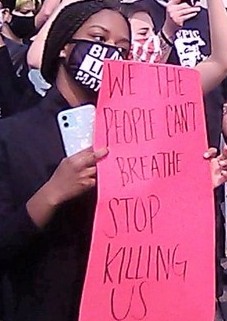 What
is becoming increasingly apparent is that existing arrangements of
governance based on the Constitution are solving no problem whatsoever
-- whether for individuals, collectives or society in general. A new
direction and new arrangements are needed. Already the demands of the
people's resistance movement show the people are taking
this up as a matter of profound concern. Demands for police out of the
communities, for defunding and disarming police and against their
replacement with private contractors are amongst the many which show
the
concern for new arrangements. What
is becoming increasingly apparent is that existing arrangements of
governance based on the Constitution are solving no problem whatsoever
-- whether for individuals, collectives or society in general. A new
direction and new arrangements are needed. Already the demands of the
people's resistance movement show the people are taking
this up as a matter of profound concern. Demands for police out of the
communities, for defunding and disarming police and against their
replacement with private contractors are amongst the many which show
the
concern for new arrangements.
For some time the view has been promoted that if only the
Constitution were upheld by the President, and if only Congress would
exercise its powers, such as the power to declare war, problems could be
resolved. For example, Trump's former Secretary of Defense, Retired
General James Mattis, spoke about Trump's order to brutally suppress
demonstrators in DC using military police and the National Guard, FBI,
Immigration and Customs Enforcement (ICE), Secret Service and others. He
said, "We know that we are better than the abuse of executive authority
that we witnessed in Lafayette Square. We must reject and hold
accountable those in office who would make a mockery of our
Constitution. Only by adopting a new path -- which means, in truth,
returning to the original path of our founding ideals -- will we again
be a country admired and respected at home and abroad."
Like others among the military and elected officials, Mattis is
attempting to position himself on the side of the people while also
making sure the call is not for a new path but to stick to the very old
path of the Constitution -- itself a compromise between the slave power
and the power of wage slavery -- and the founding fathers.
Appeals to the Constitution which, from the start, enshrines the
inequalities inherent in the existing society and perpetuates
them, rather than resolving them, are futile indeed. How else to explain
that the Constitution, with its Bill of Rights, 13th, 14th and 15th
amendments addressing the system of slave labour and "equality before
the law,"
requires yet more laws like the Civil Rights Act and the Voting Rights Act,
and repeated federal intervention in the name of "reforming" police
departments, and "protecting" the right to vote? All of this points not
to the vibrancy of the Constitution but to the fact that it is
anachronistic and fails to provide for equality or accountability
or even to block the president's impunity in the use of police powers.
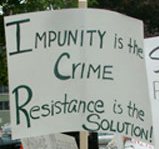 Mattis
is also clearly ignoring the president's oath of office, written in the
Constitution, that gives him these police powers. Executing the Office
of the President is done through the police powers of the president and
is a main reason why the Constitution has not and cannot block these
actions or hold the president accountable for crimes, even
with impeachment proceedings. The oath of Office says: "I do solemnly
swear (or affirm) that I will faithfully execute the Office of
President of the United States, and will to the best of my ability,
preserve, protect and defend the Constitution of the United States." Mattis
is also clearly ignoring the president's oath of office, written in the
Constitution, that gives him these police powers. Executing the Office
of the President is done through the police powers of the president and
is a main reason why the Constitution has not and cannot block these
actions or hold the president accountable for crimes, even
with impeachment proceedings. The oath of Office says: "I do solemnly
swear (or affirm) that I will faithfully execute the Office of
President of the United States, and will to the best of my ability,
preserve, protect and defend the Constitution of the United States."
While one of the fundamental aims of the Constitution was to avoid
tyranny, today the people and their stands for justice, equality and
accountability are being more and more criminalized. This has been
evident across the country, in city after city after city, as police
departments violently attack demonstrators, using chemical weapons including
tear
gas and are organized as an armed force to control and repress the
people, targeted as the enemy. Remarks by Secretary of Defense Mark
Esper reinforced this when he publicly called on the National Guard to
"dominate the battlespace."
Calls accusing opponents of sedition have also become increasingly common.
The problem today is presented as one of individuals such as Trump
who do not abide by the constitution or as a problem of racist cops or
militia and vigilantes. This serves to divert attention from the fact that
it is the state machinery -- from the military and numerous federal
forces like ICE, to militarized and racist police departments, to
the
entire penal and prison system -- that operates not to protect and
serve the people but to keep the rich in power and the people out. It
is a state machinery protected and perpetuated by the Constitution
which was designed to protect the rich and their private property, not
the rights of the people by virtue of being human and equal members of
the
polity.
The massive and repeated bailouts of the monopolies and finance
capitalists by government while the rights of the people are trampled
underfoot shows this as well. From the start the Constitution
enshrines the enslavement of Africans, genocide against Native peoples,
and the exclusion of women and all but white men of property (those
founding fathers) from any say in governance.
The Measure of a Constitution Is How it Sorts Out Individual, Collective and General Interests
The Constitution mirrors the social relations of society itself and
structures the government to preserve and perpetuate those relations,
including the many inequalities evident in society. It serves to keep
the people out of power -- when the solution today lies in creating new
forms and content which empower the people to govern and decide. It
is society, with its ensemble of human relations, that is the basis for
the state, not the other way around. The Constitution does not define
democracy and the state machinery it puts in place does not define it
either. On the contrary, the society and its relations do. Changing
those relations of power is integral to winning change that favours the
people.
In the present historical situation, the conflict between the
productive forces and the social relations of production underlies the
deepening economic and political crises, instability and
disequilibrium. The productive forces, including the modern working
class, exceed by far the bonds of the capitalist social relations of
production, with private
ownership but modern socialized production.
As we are witnessing, the private owners of capital impose their
claims on society by virtue of holding the right to the monopoly of
force of the state machinery. By claiming legitimacy and the authority
to control the right to use the monopoly of force and coercion, the
owners of capital restrict and limit the claims of the working class
and
people. But given that the people in their conditions of life are
seeing how completely restricted they are in terms of satisfying their
needs, this legitimacy and authority are being questioned. That
questioning goes far beyond the crimes of Trump and his illegitimacy,
to the broader issue of who today is fit to govern?
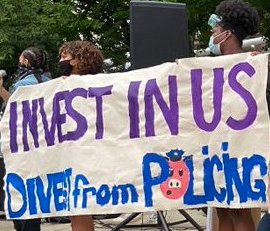 Discussions
on just what safety and security mean, in our communities, schools,
cities and country seek to provide answers. The fight is not limited to
policing and whether there should be more or less of it but rather is about who should control the
use of force and all decisions impacting peoples lives. What steps can
be taken to achieve such control is being sorted out.
Efforts to divert these debates into reliance on the Constitution serve
to deprive the people of power and ensure that imagining the future
does not mean new arrangements of governance to enshrine a modern
democracy of the people's own making. Discussions
on just what safety and security mean, in our communities, schools,
cities and country seek to provide answers. The fight is not limited to
policing and whether there should be more or less of it but rather is about who should control the
use of force and all decisions impacting peoples lives. What steps can
be taken to achieve such control is being sorted out.
Efforts to divert these debates into reliance on the Constitution serve
to deprive the people of power and ensure that imagining the future
does not mean new arrangements of governance to enshrine a modern
democracy of the people's own making.
The measure of a constitution rests in how it sorts out the
conflicting interests in society -- individual, collective and general
interests of society and humanity as a whole. These interests come from
society itself, from the ensemble of human relations between humans and
humans and humans and nature. It is a whole ensemble and a constitution
plays a role in sorting out and systematizing the relations and the
conflicting interests they give rise to. Interests have to do with
rights, of individuals and collectives. Harmonizing them has to do with
putting them on a par, having an equivalence, so it is not individual
over collective or collective over individual, but they are understood
in such a
manner as to be on a par. Only if they are on par can an equilibrium be
found.
It is clear that the U.S. Constitution has not and cannot sort out
these interests in a manner that harmonizes them. On the contrary, it
blocks such a path and enforces the divisions and inequality in
society, contributing to institutionalizing them.
The people's resistance is setting a new direction for political
affairs, one that does not rely on the old outdated Constitution and
its legacy which empowers the descendants of the "white men of
property," whoever they may be. The people's resistance places itself
squarely on the side of the fight for what is New, for a democracy of
the people's
own making where "we, the people" decide. Modern institutions of
government and a modern constitution can be developed as the people advance their struggle to put the decision-making power
in their own hands.

(To access articles individually click on the black headline.)
PDF
PREVIOUS
ISSUES | HOME
Website: www.cpcml.ca
Email: office@cpcml.ca
|

